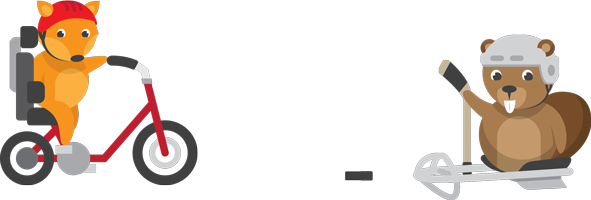Research and evaluation are important parts of the services provided by the Rehabilitation Centre for Children. Research helps us learn new things and provide better care and new technologies for our children and youth. Evaluations and quality improvement projects are done to make sure that we are doing the best things for our programs and services. Clinicians, therapists and other staff at RCC do research and quality improvement projects. Researchers from universities and health centres in Manitoba, across Canada, and internationally also do research at RCC and SSCY Centre.
The goals of research and evaluation at RCC are to:
- learn more about issues that are important to our children, youth and families
- improve care received through RCC
- increase community participation
- improve quality of life for our children, youth and families
Our children, youth and families are important partners in research at RCC. We work with families to make sure that we are doing research that matters to you. Participants in research and evaluation projects can be children, youth, caregivers and families. Every project is different, and it is up to you to decide if you want to join a project. Some of our research projects also have clients and families as research team members, so that families can give more input into research plans and goals.
We share research results with families so that participants and other families know what we did and how we are using the results. We use the results from our research and evaluation projects to:
- give information to families and clinicians
- offer new programs and technologies
- improve services
You can learn more about our research and program evaluations below. Join the RCC/SSCY Centre Family Network and follow us on Facebook and Twitter to stay up to date on research and evaluation projects at RCC! Please contact our Research Associate for more information, to join a project, if you have an idea for research, or if you have any questions: Elizabeth Hammond PT, PhD at ehammond@rccinc.ca or (204) 258-6717.
For families that are interested to learn more about research projects happening onsite, please consider filling out our consent to contact for future research form. This will allow us to let you know about studies that you are eligible to participate in, so you will not miss out on any of these opportunities.
Once filled out please send it to ehammond@rccinc.ca.
Evidence-based practice (or evidence-informed practice, research-informed practice, or best clinical practice) is a way of knowing how to provide the right care for the right child or youth at the right time. Our clinicians and therapists use information about:
- research data and guidelines (information about different treatments from research projects, and formal guidelines that describe best treatment options)
- current health care resources (like funding, supplies, equipment, wait times, and length of appointments)
- clinical state and conditions (medical information about the client, like their diagnosis and current health)
- client and family preferences (what the client and their family want from their treatment plan, and how much time they have to work on it)
- clinical expertise (like the clinician’s education and experience)
to make the best possible treatment plan for each client, that meets the needs of the client and their family.
RCC clinicians follow Canadian and International guidelines when making treatment plans. They also use standardized assessments to measure client progress whenever possible. Standardized assessments (also called outcome measures) are tools like walking tests, strength tests and surveys that are done the same way for every child or youth, so that they can be used to see if the treatment plan is working. Many RCC clinicians are also members of different Canadian committees that work on making guidelines and assessment tools.
Our Research Associate works with our clinicians and managers to evaluate RCC programs and services. We want to make sure that the care we provide is safe and effective, and meets the needs of our clients and families. That way we are providing the best possible service. Here are some of our past and current program evaluations:
The Specialized Communication Resources for Children (SCRC) Library has over 700 children’s picture books for anyone to borrow. Picture communication symbols have been added to the text to help with learning and understanding. We evaluated the Library in 2015 to find out if people like the books and materials, if they are helping children, and how the Library can be improved.
Library users told us that the books and materials were easy for children to use, and they helped with their child’s learning. Users would like books on more topics, and for older children. Users also told us that they would like more help picking which books to use, and more instructions on how to use the books.
The Library is now working on adding more books and making written instructions for users. We want to listen to our users to make the Library better. You can download our poster here to read all of the results. You can learn more about the Library here.
The Children’s Rehabilitation Foundation (CRF) funds many different types of equipment for children and youth. In 2017, we asked families who have equipment from CRF to fill out a survey to tell us how they are using the equipment and how happy they are with the equipment and the application process.
Families told us that their equipment is easy to use, helps their child be independent, and helps them participate in the activities they want to. Families also said that they were given enough training to use the equipment safely, and they know who to call if they have any problems.
Now, CRF is working on having every family fill out a survey about their equipment after having it for 9 months. This will help CRF make sure that every child and youth is getting the best equipment, and is using it in the best way possible. You can learn more about CRF and how they help on their website.
The Neuromuscular Clinic provides care to children and youth with Muscular Dystrophy. International Care Guidelines were created for the diagnosis and management of Muscular Dystrophy in 2010. In 2017 we started an evaluation of our Clinic to make sure that we are following the Care Guidelines. This will make sure we are providing the best care to our children and youth. For the first part of this project, we are looking at two things in the Care Guidelines:
- Children and youth should see a respirologist (a lung and breathing specialist) at least once or twice a year
- Children and youth should be seen by a cardiologist (a heart specialist) who checks on their heart function
We are looking at our medical charts to find out if we are following the Care Guidelines for our Clinic clients. We will use results from this project to provide better care in our Neuromuscular Clinic.
The Paediatric Rehabilitation Reporting System (PRRS) is a database used by paediatric rehabilitation centres across Canada. It lets centres across Canada share information about diagnoses, treatments and outcomes. By sharing this information, clinicians and managers are able to measure and compare the quality of services across Canada, so that they can improve services for all children and youth.
RCC was one of the first centres to join PRRS in its testing project in 2009. Right now the database includes information about Cerebral Palsy and Autism. We are looking forward to more centres joining, and for more diagnoses to be included. Visit the PRRS website to learn more.
Below are research projects being conducted by RCC clinicians.
Physiotherapists work with families on handling and positioning techniques, and recommend play-based activities to improve neck range of motion, strength and development, for babies with torticollis and/or plagiocephaly. In Winnipeg, babies are usually assessed and treated one at a time. Other centres across Canada have started group treatment to reduce wait times and help with learning between families.
The goal of this project is to make sure evidence-based, timely care is provided for babies referred for torticollis and/or plagiocephaly. The objectives are to:
- understand how other centres are delivering treatment across Canada
- work with Winnipeg families and physiotherapists to re-design how care is delivered here
- pilot test and evaluate a system redesign that may include group treatment
Our FASD Centre is part of a cross-Canada project to confirm whether certain functional issues may be particularly common in children with neurodevelopmental disabilities. By comparing and contrasting individuals affected by Fetal Alcohol Spectrum Disorder (FASD), Autism Spectrum Disorder (ASD), and Cerebral Palsy (CP), it is hoped that the study will show that all three patient groups have similar patterns of brain impairment and could benefit from similar treatment recommendations and interventions.
The information gathered will also be useful in determining the risk factors and prevalence of the disorders regionally, as well as providing valuable information to communities and governments to improve service provision and support for individuals and families impacted by these disorders across Canada.
Our FASD Centre is doing a project to describe the developmental profile of preschool children with FASD seen by the Manitoba FASD Centre over the past 11 years. We will describe the demographic, language and motor/sensory profiles of children under 5 who have been seen at the Manitoba FASD Centre. We will also be looking at any behavioral difficulties identified in preschoolers seen at the Manitoba FASD Centre.
We are engaging in this research in the hopes that it will help us to better understand and identify preschool presentations, support earlier diagnosis, and facilitate appropriate interventions at young ages.
Our Neuromuscular Clinic is part of the Canadian Neuromuscular Disease Registry (CNDR), which is a national research project based at the University of Calgary. The purpose of the CNDR is to build a database of people suffering from neuromuscular disease across Canada. The CNDR database will collect medical information about people suffering from Duchenne Muscular Dystrophy (DMD), Myotonic Dystrophy (DM) Types 1 and 2, and Guillane Barré Syndrome. Finally, the database will collect contact information and the diagnosis of people suffering from any other neuromuscular disease or disorder.
By collecting detailed information on people with DMD and DM, the CNDR hopes to increase access to research opportunities. The CNDR also hopes that continued collection of health information will help to improve the consistency of care across the country. By collecting contact information and diagnosis for people suffering from other neuromuscular diseases, the CNDR plans to help people with uncommon conditions in finding research opportunities. This network will provide better information on the number of people and location of people with each disease. This will allow the CNDR to work with various groups to improve available funding and research opportunities within these diseases.
Researchers from the University of Manitoba and physicians at SSCY Centre are working together on a cross-Canada project to find ways to support and empower families of children with suspected developmental delays as they wait for formal care. The research team will make a coaching package for families to use while they wait for formal care.
This package will have a coach for parents to talk to, online learning, and can connect parents who are also waiting for formal care. The package will be given to 175 families (75 in Manitoba) to use while they wait for formal care. Another group of 175 families (75 in Manitoba) will not get the package, and will wait for formal care the same way families do now. At the start of the study, at 9 months, and at 18 months, the families in both groups will be asked questions that assess if the package is helping them while they wait, or not.
Are you interested in participating? Read our brochure for more information!
Our Neonatal Follow-Up Program is working on a cross-Canada project to improve the cognitive and language outcomes of premature newborns born <29 weeks gestation. Long term complications of prematurity, including delays in development, are very common.
From previous research it is known that there are interventions which are done after hospital discharge which have improved cognitive and language skills in children born preterm. These interventions vary in intensity, setting, timing and approach and many of them are a “package” of treatments which are complex or costly to provide. The components of the early intervention programs that are effective have not been studied.
This study involves trying out simple feasible interventions or a part of a “package” of proven treatments that are acceptable to a group of local experts and a parent representative. Every 3 to 6 months, the team will review whether the intervention is meeting its goals and it will be adapted and improved. This will happen over a 2 year period in 12 Neonatal Follow-up clinics across Canada, who will talk regularly with each other and learn from each other’s experiences using proven quality improvement techniques. Information about cognitive and language abilities of children born preterm at <29 weeks gestation who are 18 to 24 month old will be collected as part of another existing study to see whether this strategy works to improve the abilities of children born preterm.
The Prosthetics Program at RCC provides upper limb prosthetic devices to about 50 children and youth. A wrist unit attaches the terminal device (such as a hand, hook, or hockey stick adapter) to the user’s limb socket. Right now, there are no wrist units made in child sizes, so children have to use an adult-sized wrist unit. These units are often bulky and heavy, and are hard to adjust without help. These wrist units can also break when used for activities that have a lot of force, like riding a bike or playing in a playground.
This project will design, make, and test a new type of wrist unit, which would be better for children to use. We will ask six children to test the new wrist unit, to find out if it easy to use, and if it can be used for different types of activities. We will compare the new wrist unit to the units children are using right now. We will make changes to the wrist unit based on what participants say about it, so that we keep making it better. Our goal is to be able to give all our clients this new wrist unit as part of their prosthetic device.
“We are the stories we tell ourselves.” – Joan Didion
Through personal stories, we connect with other people, learn about and express who we are, understand the perspectives of other people, and advocate for what we and others need. Children with autism need to do all these things for the same reasons as everyone else, but often have difficulty sharing and reflecting on their experiences.
Support from clinicians is expensive and difficult to access for many families. However, parents have a unique place in their child’s life, as parents are the people who spend the most time with their children. They have a history of shared memories, and that makes it easier for them to reminisce together.
In this study, parents will have the opportunity to learn how to support collaborative storytelling with their child by practicing the strategies they learn in a two-hour seminar. Recordings of conversations between parents and children will be collected over the following weeks to see if parents can and do change their habits of conversation. Feedback from a focus group discussion will be used to answer whether families find this kind of parent training to be a helpful form of support.
Potential benefits of this study include improved listening and communication skills for both parent and child, and the opportunity to build understanding of strategies for supporting language development for children with autism spectrum disorders.
In order to participate, the child must be between the ages of 8 and 16, be diagnosed with autism, and be able to speak using sentences in English.










